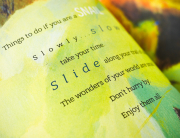By Penny Kittle, Author and Founder of Book Love Foundation
I talk about books every day in my classroom. It’s my daily chance to romance readers, to challenge readers, to sell all the possibilities stacked upon the shelves in my room. Sometimes students listen to me read a short, dynamic passage. Sometimes I show a book trailer or read an excerpt from an author interview. Lately, I’ve been teaching students to study short passages from books to learn more about writing.
 Michael Lewis says he wrote Moneyball because he “fell in love with a story.” And what a story it is… perhaps you saw the movie with Brad Pitt. In our small town in the ountains of North Conway, students still remember dozens of talent scouts holding radar guns and clipboards behind home plate as local legend and Kennett High School student Jeff Locke neared graduation. (He was drafted by the Atlanta Braves and now plays for the Pittsburgh Pirates.) How did the teams decide to bet on Jeff? I pulled out three sentences for students to study in order to raise interest in the book, to show how teams scout talent, and to study author’s craft: “The scouts actually carried around checklists. “Tools” is what they called the talents they were checking for in a kid. There were five tools: the abilities to run, throw, field, hit, and hit with power.”
Michael Lewis says he wrote Moneyball because he “fell in love with a story.” And what a story it is… perhaps you saw the movie with Brad Pitt. In our small town in the ountains of North Conway, students still remember dozens of talent scouts holding radar guns and clipboards behind home plate as local legend and Kennett High School student Jeff Locke neared graduation. (He was drafted by the Atlanta Braves and now plays for the Pittsburgh Pirates.) How did the teams decide to bet on Jeff? I pulled out three sentences for students to study in order to raise interest in the book, to show how teams scout talent, and to study author’s craft: “The scouts actually carried around checklists. “Tools” is what they called the talents they were checking for in a kid. There were five tools: the abilities to run, throw, field, hit, and hit with power.”
Students talked in pairs and made a list of what they noticed. I encourage students to make theories about the use of punctuation: why put tools in quotes? Why use a colon in the last sentence?
Through regular practice in sentence study my students begin to see beyond punctuation to the sound of sentences, offering comments like this: “Listen to all the c’s: carried, checklists, checking, kid,” Robert says. “And scouts,” Whipple suggests. Another student mentions how the tools are all one-word skills except for the last. “The rhythm would sound wrong if ‘hit with power’ were in the middle of the list,” he adds.
The following day I used a passage from Start Something That Matters by Blake Mycoskie. This is a most popular book in my classroom because it tells the story of the founding of TOMS shoes, often seen on the feet of students in my high school. There are two interesting things that happen here that I hope students will notice:
it tells the story of the founding of TOMS shoes, often seen on the feet of students in my high school. There are two interesting things that happen here that I hope students will notice:
“When I returned to Argentina, my main mission was to lose myself in its culture. I spent my days learning the national dance (the tango), playing the national sport (polo), and, of course, drinking the national wine (Malbec). I also got used to wearing the national shoe: the alpargata, a soft, casual shoe worn by almost everyone in the country, from polo players to farmers to students. I saw this incredibly versatile shoe everywhere: in the cities, on the farms, in the nightclubs. An idea began to form in the back of my mind: Maybe the alpargata would have some market appeal in the United States.”
First, the parentheses are a playful way to add information. Second, there are three colons used in three sentences. Can students explain why? How? Creating theories about punctuation helps students understand that authors craft sentences with intention. This thinking leads to experiments with their own writing and a growing attention to not only what books say, but how it is said.
Hopefully, it will also lead another reader in my room to another great book.
Written by Penny Kittle, author of Book Love and the President and Founder of the Book Love Foundation. She created the Foundation to get more books in classroom libraries across the country. Penny is currently an English teacher and literacy coach at Kennett High School in North Conway, New Hampshire. Her career in teaching began in a third grade classroom in Hesperia, California, and has taken her to Oregon, Washington, Ohio, Michigan, and now to New Hampshire. She has taught grades 3-graduate school. In the summer Penny teaches in Durham at the University of New Hampshire Literacy Institutes.







Leave A Comment